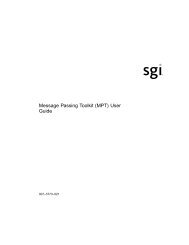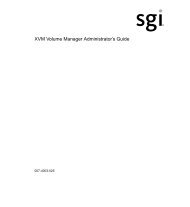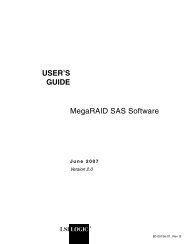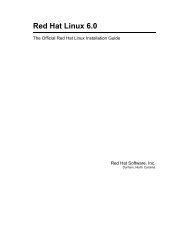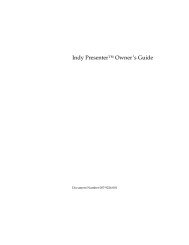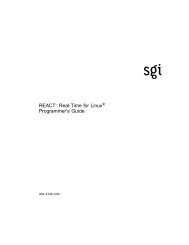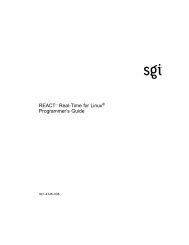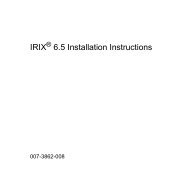- Page 1 and 2:
MIPS R10000 Microprocessor User’s
- Page 3 and 4:
Acknowledgments This book represent
- Page 5 and 6:
About This Manual Glossary Stylisti
- Page 7 and 8:
Table of Contents vii Contents Ackn
- Page 9 and 10:
Table of Contents ix Superscalar In
- Page 11 and 12:
Table of Contents xi 3 Interface Si
- Page 13 and 14:
Table of Contents xiii 5 Secondary
- Page 15 and 16:
Table of Contents xv SysAD[63:0] Ad
- Page 17 and 18:
Table of Contents xvii 7 Clock Sign
- Page 19 and 20:
Table of Contents xix 9 Error Prote
- Page 21 and 22:
Table of Contents xxi 11 JTAG Inter
- Page 23 and 24:
Table of Contents xxiii 13 Packagin
- Page 25 and 26:
Table of Contents xxv Branch on Cop
- Page 27 and 28:
Table of Contents xxvii 16 Memory M
- Page 29 and 30:
Table of Contents xxix 18 A Cache T
- Page 31 and 32:
1. Introduction to the R10000 Proce
- Page 33 and 34:
Introduction to the R10000 Processo
- Page 35 and 36:
Introduction to the R10000 Processo
- Page 37 and 38:
Introduction to the R10000 Processo
- Page 39 and 40:
Introduction to the R10000 Processo
- Page 41 and 42:
Introduction to the R10000 Processo
- Page 43 and 44:
Introduction to the R10000 Processo
- Page 45 and 46:
Introduction to the R10000 Processo
- Page 47 and 48:
Introduction to the R10000 Processo
- Page 49 and 50:
Introduction to the R10000 Processo
- Page 51 and 52:
Introduction to the R10000 Processo
- Page 53 and 54:
Introduction to the R10000 Processo
- Page 55 and 56:
Introduction to the R10000 Processo
- Page 57 and 58:
Introduction to the R10000 Processo
- Page 59 and 60:
Introduction to the R10000 Processo
- Page 61 and 62:
Introduction to the R10000 Processo
- Page 63 and 64:
2. System Configurations The R10000
- Page 65 and 66:
System Configurations 35 2.2 Multip
- Page 67 and 68:
3. Interface Signal Descriptions Th
- Page 69 and 70:
Interface Signal Descriptions 39 3.
- Page 71 and 72:
Interface Signal Descriptions 41 3.
- Page 73 and 74:
Interface Signal Descriptions 43 3.
- Page 75 and 76:
4. Cache Organization and Coherency
- Page 77 and 78:
Cache Organization and Coherency 47
- Page 79 and 80:
Cache Organization and Coherency 49
- Page 81 and 82:
Cache Organization and Coherency 51
- Page 83 and 84:
Cache Organization and Coherency 53
- Page 85 and 86:
Cache Organization and Coherency 55
- Page 87 and 88:
Cache Organization and Coherency 57
- Page 89 and 90:
5. Secondary Cache Interface The pr
- Page 91 and 92:
Secondary Cache Interface 61 5.2 Se
- Page 93 and 94:
Secondary Cache Interface 63 Indexi
- Page 95 and 96:
Secondary Cache Interface 65 Errata
- Page 97 and 98:
Secondary Cache Interface 67 SCTag(
- Page 99 and 100:
Secondary Cache Interface 69 4-Word
- Page 101 and 102:
Secondary Cache Interface 71 16 or
- Page 103 and 104:
Secondary Cache Interface 73 5.7 Wr
- Page 105 and 106:
Secondary Cache Interface 75 8-Word
- Page 107 and 108:
Secondary Cache Interface 77 Tag Wr
- Page 109 and 110:
6. System Interface Operations The
- Page 111 and 112:
System Interface Operations 81 6.4
- Page 113 and 114:
System Interface Operations 83 6.8
- Page 115 and 116:
System Interface Operations 85 Mult
- Page 117 and 118:
System Interface Operations 87 Exte
- Page 119 and 120:
System Interface Operations 89 6.10
- Page 121 and 122:
System Interface Operations 91 Outg
- Page 123 and 124:
System Interface Operations 93 6.11
- Page 125 and 126:
System Interface Operations 95 6.13
- Page 127 and 128:
System Interface Operations 97 Duri
- Page 129 and 130:
System Interface Operations 99 Erra
- Page 131 and 132:
System Interface Operations 101 Cyc
- Page 133 and 134:
System Interface Operations 103 Sys
- Page 135 and 136:
System Interface Operations 105 Sys
- Page 137 and 138:
System Interface Operations 107 6.1
- Page 139 and 140:
System Interface Operations 109 Sys
- Page 141 and 142:
System Interface Operations 111 Mul
- Page 143 and 144:
System Interface Operations 113 Err
- Page 145 and 146:
System Interface Operations 115 Pro
- Page 147 and 148:
System Interface Operations 117 Err
- Page 149 and 150:
System Interface Operations 119 Pro
- Page 151 and 152:
System Interface Operations 121 Pro
- Page 153 and 154:
System Interface Operations 123 Pro
- Page 155 and 156:
System Interface Operations 125 Pro
- Page 157 and 158:
System Interface Operations 127 Ext
- Page 159 and 160:
System Interface Operations 129 Ext
- Page 161 and 162:
System Interface Operations 131 Cyc
- Page 163 and 164:
System Interface Operations 133 Ext
- Page 165 and 166:
System Interface Operations 135 Ext
- Page 167 and 168:
System Interface Operations 137 Pro
- Page 169 and 170:
System Interface Operations 139 Pro
- Page 171 and 172:
System Interface Operations 141 6.1
- Page 173 and 174:
System Interface Operations 143 Coh
- Page 175 and 176:
System Interface Operations 145 Err
- Page 177 and 178: System Interface Operations 147 The
- Page 179 and 180: System Interface Operations 149 In
- Page 181 and 182: System Interface Operations 151 Cyc
- Page 183 and 184: System Interface Operations 153 6.2
- Page 185 and 186: 7. Clock Signals The R10000 process
- Page 187 and 188: Clock Signals 157 7.2 Secondary Cac
- Page 189 and 190: 8. Initialization This section desc
- Page 191 and 192: Initialization 161 Errata Vcc VccQ[
- Page 193 and 194: Initialization 163 8.4 Soft Reset S
- Page 195 and 196: Initialization 165 Table 8-1 (cont.
- Page 197 and 198: 9. Error Protection and Handling Th
- Page 199 and 200: Error Protection and Handling 169 9
- Page 201 and 202: Error Protection and Handling 171 9
- Page 203 and 204: Error Protection and Handling 173 9
- Page 205 and 206: Error Protection and Handling 175 9
- Page 207 and 208: Error Protection and Handling 177 D
- Page 209 and 210: Error Protection and Handling 179 T
- Page 211 and 212: Error Protection and Handling 181 E
- Page 213 and 214: Error Protection and Handling 183 W
- Page 215 and 216: Error Protection and Handling 185 P
- Page 217 and 218: 10. CACHE Instructions This chapter
- Page 219 and 220: CACHE Instructions 189 TLB Refill a
- Page 221 and 222: CACHE Instructions 191 Op Field Enc
- Page 223 and 224: CACHE Instructions 193 10.4 Index W
- Page 225 and 226: CACHE Instructions 195 10.7 Index L
- Page 227: CACHE Instructions 197 10.11 Hit In
- Page 231 and 232: CACHE Instructions 201 10.17 Index
- Page 233 and 234: 11. JTAG Interface Operation Errata
- Page 235 and 236: JTAG Interface Operation 205 11.2 I
- Page 237 and 238: JTAG Interface Operation 207 ‡ Wi
- Page 239 and 240: 12. Electrical Specifications This
- Page 241 and 242: Electrical Specifications 211 DCOk
- Page 243 and 244: Electrical Specifications 213 Unuse
- Page 245 and 246: Electrical Specifications 215 12.2
- Page 247 and 248: Electrical Specifications 217 12.3
- Page 249 and 250: 13. Packaging The R10000 microproce
- Page 251 and 252: Packaging 221 Electrical Characteri
- Page 253 and 254: Packaging 223 Figure 13-1 R10000 59
- Page 255 and 256: Packaging 225 Table 13-3 (cont.) Si
- Page 257 and 258: Packaging 227 Table 13-3 (cont.) Si
- Page 259 and 260: Packaging 229 Table 13-3 (cont.) Si
- Page 261 and 262: Packaging 231 Figure 13-3 599LGA PW
- Page 263 and 264: Packaging 233 Figure 13-5 599LGA Bo
- Page 265 and 266: 14. Coprocessor 0 This chapter desc
- Page 267 and 268: Coprocessor 0 237 14.1 Index Regist
- Page 269 and 270: Coprocessor 0 239 14.3 EntryLo0 (2)
- Page 271 and 272: Coprocessor 0 241 14.4 Context (4)
- Page 273 and 274: Coprocessor 0 243 14.6 Wired Regist
- Page 275 and 276: Coprocessor 0 245 14.9 EntryHi Regi
- Page 277 and 278: Coprocessor 0 247 CU2 CU2 CU1 CU1 C
- Page 279 and 280:
Coprocessor 0 249 Diagnostic Status
- Page 281 and 282:
Coprocessor 0 251 Coprocessor Acces
- Page 283 and 284:
Coprocessor 0 253 Table 14-13 Cause
- Page 285 and 286:
Coprocessor 0 255 14.13 Processor R
- Page 287 and 288:
Coprocessor 0 257 14.15 Load Linked
- Page 289 and 290:
Coprocessor 0 259 14.17 XContext Re
- Page 291 and 292:
Coprocessor 0 261 14.19 Diagnostic
- Page 293 and 294:
Coprocessor 0 263 Errata There are
- Page 295 and 296:
Coprocessor 0 265 Errata Errata The
- Page 297 and 298:
Coprocessor 0 267 Event 1 for Count
- Page 299 and 300:
Coprocessor 0 269 Event 6 for Count
- Page 301 and 302:
Coprocessor 0 271 Event 14 for Coun
- Page 303 and 304:
Coprocessor 0 273 14.21 ECC Registe
- Page 305 and 306:
Coprocessor 0 275 CacheErr Register
- Page 307 and 308:
Coprocessor 0 277 CacheErr Register
- Page 309 and 310:
Coprocessor 0 279 Errata Primary In
- Page 311 and 312:
Coprocessor 0 281 Errata Errata Sec
- Page 313 and 314:
Coprocessor 0 283 Primary Data Cach
- Page 315 and 316:
Coprocessor 0 285 14.25 CP0 Instruc
- Page 317 and 318:
Coprocessor 0 287 14.27 CACHE Instr
- Page 319 and 320:
Coprocessor 0 289 Cache CACHE (cont
- Page 321 and 322:
Coprocessor 0 291 14.29 DMTC0 Instr
- Page 323 and 324:
Coprocessor 0 293 14.31 MFC0 Instru
- Page 325 and 326:
Coprocessor 0 295 MTPS 31 Format: M
- Page 327 and 328:
Coprocessor 0 297 14.34 TLBP Instru
- Page 329 and 330:
Coprocessor 0 299 14.36 TLBWI Instr
- Page 331 and 332:
15. Floating-Point Unit This sectio
- Page 333 and 334:
Floating-Point Unit 303 15.2 Floati
- Page 335 and 336:
Floating-Point Unit 305 Load and St
- Page 337 and 338:
Floating-Point Unit 307 63 63 Doubl
- Page 339 and 340:
Floating-Point Unit 309 Floating-Po
- Page 341 and 342:
Floating-Point Unit 311 Loading the
- Page 343 and 344:
Floating-Point Unit 313 Moves and C
- Page 345 and 346:
16. Memory Management This section
- Page 347 and 348:
Memory Management 317 Addressing Mo
- Page 349 and 350:
Memory Management 319 32-bit User M
- Page 351 and 352:
Memory Management 321 32-bit Superv
- Page 353 and 354:
Memory Management 323 32-bit Kernel
- Page 355 and 356:
Memory Management 325 0X BFFFFFFF 0
- Page 357 and 358:
Memory Management 327 64-bit Virtua
- Page 359 and 360:
Memory Management 329 Using the TLB
- Page 361 and 362:
17. CPU Exceptions This chapter des
- Page 363 and 364:
CPU Exceptions 333 17.3 TLB Refill
- Page 365 and 366:
CPU Exceptions 335 Priority of Exce
- Page 367 and 368:
CPU Exceptions 337 Soft † Reset E
- Page 369 and 370:
CPU Exceptions 339 NMI Exception Ca
- Page 371 and 372:
CPU Exceptions 341 TLB Exceptions T
- Page 373 and 374:
CPU Exceptions 343 TLB Invalid Exce
- Page 375 and 376:
CPU Exceptions 345 Cache Error Exce
- Page 377 and 378:
CPU Exceptions 347 Integer Overflow
- Page 379 and 380:
CPU Exceptions 349 System Call Exce
- Page 381 and 382:
CPU Exceptions 351 Reserved Instruc
- Page 383 and 384:
CPU Exceptions 353 Floating-Point E
- Page 385 and 386:
CPU Exceptions 355 Interrupt Except
- Page 387 and 388:
CPU Exceptions 357 17.5 COP0 Instru
- Page 389 and 390:
18. Cache Test Mode The R10000 proc
- Page 391 and 392:
Cache Test Mode 361 18.3 Entering C
- Page 393 and 394:
Cache Test Mode 363 18.5 SysAD(63:0
- Page 395 and 396:
Cache Test Mode 365 Auto-Increment
- Page 397 and 398:
Cache Test Mode 367 Auto-Increment
- Page 399 and 400:
A. Glossary The following terms are
- Page 401 and 402:
A.6 Dynamic Scheduling The R10000 p
- Page 403 and 404:
A.11 Nonblocking Loads and Stores M
- Page 405 and 406:
A.13 Logical and Physical Registers
- Page 407 and 408:
Index I-1 Index Numerics 16-word, c
- Page 409 and 410:
Index I-3 uncached accelerated, des
- Page 411 and 412:
Index I-5 branch on CP0 instruction
- Page 413 and 414:
Index I-7 F fetch pipeline 6, 17 fe
- Page 415 and 416:
Index I-9 TLBWR 285, 300 unsupporte
- Page 417 and 418:
Index I-11 NMI see also nonmaskable
- Page 419 and 420:
Index I-13 CP0 (description of) 235
- Page 421 and 422:
Index I-15 SysAD[20:16] interrupt r
- Page 423 and 424:
Index I-17 SysWrRdy, signal 41, 118




